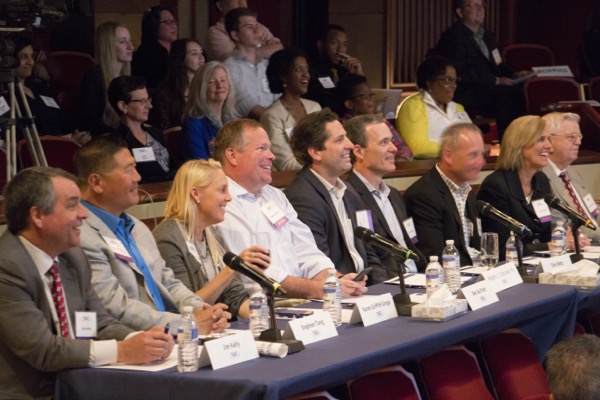Hen Hatch winners
$100,000-plus prize pool shared between UD startups at Hen Hatch competition
8:45 a.m., May 12, 2016--John Erbey, a University of Delaware alumnus who has developed a new therapy for acute kidney injury, received $21,500 as a winner of UD’s premier startup funding competition, Hen Hatch.
“Acute kidney injury is a massive public health problem in not only the United States, but the rest of the world,” said Erbey, adding that the condition kills 300,000 Americans and costs the national health care system $10 billion each year.
Honors Stories
National Medal of Science
Warren Award
Erbey, a1993 graduate of UD’s College of Health Sciences and founder and CEO of Strataca Systems LLC, presented his solution, a device called Juxtaflow, to Hen Hatch’s panel of nine judges.
What makes Juxtaflow unique, Erbey explained, is that most treatment of acute kidney injury focuses on a loss of forward flow: “There’s not enough blood going from the heart to the kidney to supply its needs.”
“But the way we look at it, venous congestion, or the inability to get blood out of the organ, is the sustaining injury,” Erbey explained. He used the analogy of evening rush hour traffic, a congestion that needs to be cleared out.
Erbey’s system consists of an external pump unit and a set of proprietary catheters inserted via a minimally invasive procedure, essentially “delivering suction to the kidney… to keep it moving, to keep it alive.”
This “can have the impact of reducing the ICU (intensive care unit) length of stay, reducing the need for dialysis, reducing 30-day readmission rates… improving the cost of the care and ultimately hopefully improving survival for these patients,” Erbey said.
Erbey said that his Hen Hatch winnings will go toward the next steps of product development, including an observational study of patients and a submission to the Food and Drug Administration, with the ultimate goal of being on the market by next year.
Another big Hen Hatch winner, taking home $16,800, was JADE Biotech. This team of students from the College of Engineering, including Elizabeth Soulas, Daniel Charytonowicz, John Lowman and Allison Lisberg, created Chroma, a DNA-based drug identification system that helps deter the theft of liquid narcotics in hospitals.
“Each year, 600 million narcotic substance orders are placed by hospital personnel across the United States,” Soulas said. But since dosages vary from patient to patient, 400 million of these orders are not fully administered, resulting in excess volume known as “narcotic waste.”
Soulas and teammate Lowman explained that hospitals must identify and dispose of narcotic waste to prevent drug diversion, or theft of hospital narcotics.
“Unfortunately for pharmacy administrators, none of the methods that are currently in place are at all adequate for preventing drug diversion,” Lowman said.
“This kind of activity can have huge financial consequences for hospital systems,” he continued. “For instance, between 2009 and 2014, a hospital based out of New York lost over $5.5 million worth of narcotic inventory to one diverter. Just this past year, a hospital based out of Boston paid out a record $2.3 million settlement for their inability to prevent diversion within their own system.”
The JADE team’s solution, Chroma, is a patent-pending device that utilizes small strands of DNA molecules that bind to substances. When combined with small nanoparticles in solution, this produces a color change that is dependent on concentration.
The team plans to adapt this technology into a small module compatible with smartphones, making the addition cost-effective and easy to use. The team added that their method would improve the prevention of drug diversion by providing faster and more accurate results than any current options on the market.
Other winners in the student track included the Curing Cube team, with Farhad Baqi from the Alfred Lerner College of Business and Economics and Seyar Baqi and Edward Bayley from the College of Arts and Sciences. The team won $13,200 for development of the Curing Cube, dental equipment that features LED light and cures dental products from all angles quickly, efficiently and without added heat.
And Joost Elling from the College of Agriculture and Natural Resources won $7,000 for his Joost Wafel Co., a food manufacturing and sales business specializing in award-winning Stroopwafels. These Dutch cookies made from caramel sandwiched between two thin, crisp waffle layers also won the Audience Choice award.
In the alumni, faculty and staff track, 2012 Lerner College alumnus Jonathan Hoxter won $9,000 for his business NERDit NOW, a mobile repair shop for cell phones, tablets and laptops.
A 2015 College of Engineering alum, Chris Lin, also won $5,500 for Flip, a company based around a wallet he designed that he calls the first of its kind. The Flip wallet makes cards and cash more accessible without adding bulk.
Dan Freeman, director of UD’s Horn Program in Entrepreneurship, said the program was proud to host Hen Hatch and to offer guidance, visibility, startup funding and in-kind services to help UD entrepreneurs pursue and improve their business concepts.
“What if higher education focused on missions, not majors?” Freeman asked during his opening address at Hen Hatch. “What if we prioritized impact, not rankings?”
“What if we viewed students as active collaborators who are responsible for co-creating and pursuing educational opportunities, rather than passive recipients of knowledge? What if we design our programming to ignite imaginations and empower world-changers?”
His team at the Horn Program, Freeman said, “is dedicated to answering these what-if questions.”
During his opening address, Freeman also described the Hen Hatch process. This year, the process included 70 written concept submissions, which were evaluated by dozens of esteemed judges based on feasibility and growth potential before finalists were selected.
About the Horn Program in Entrepreneurship
The Horn Program ignites imaginations and empowers world changers through entrepreneurial education.
The program’s offerings emphasize experiential learning, evidence-based entrepreneurship and active engagement with entrepreneurs, business leaders and members of the broader entrepreneurial ecosystem.
Participation in Horn Program courses and co-curricular activities empowers students by providing them with the knowledge, skills, connections and access to resources needed to successfully create, deliver and capture value from new ideas and thrive in our rapidly changing world.












